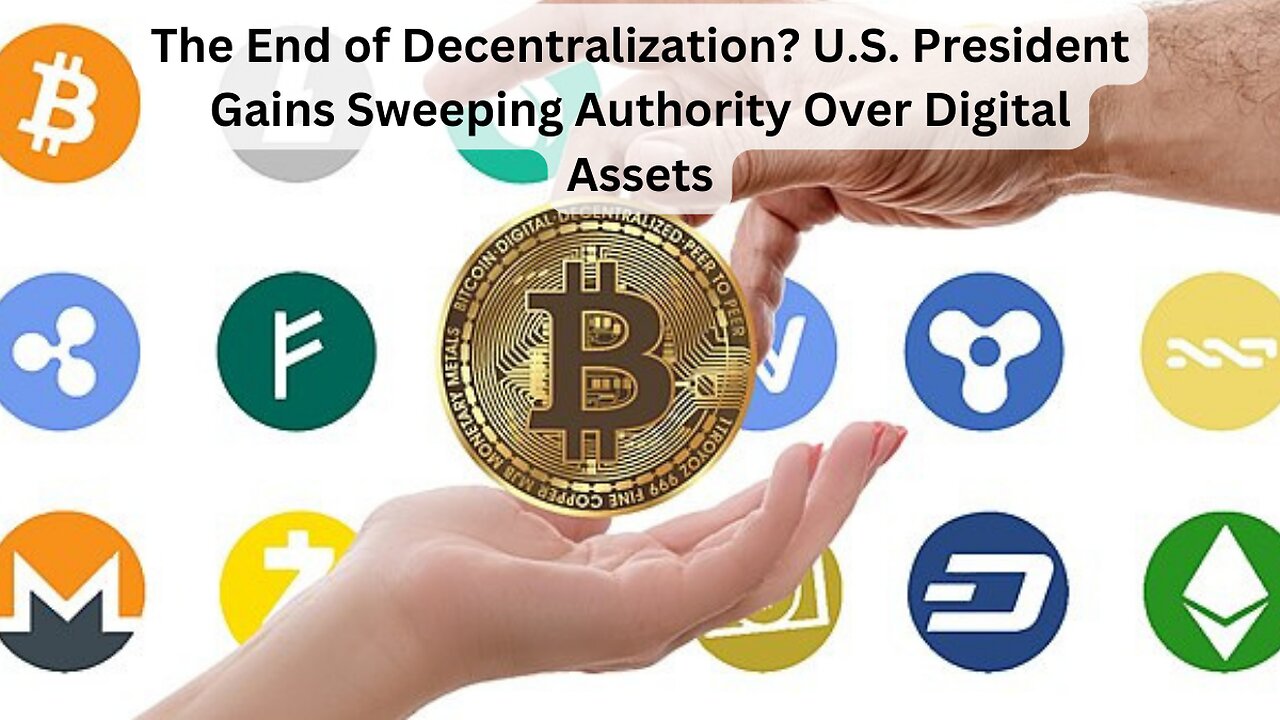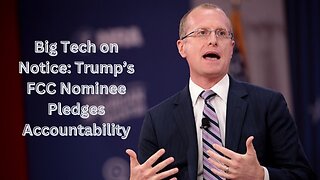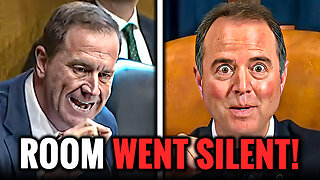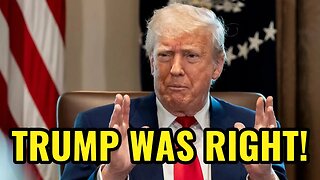Premium Only Content

The End of Decentralization? U.S. President Gains Sweeping Authority Over Digital Assets
A recent U.S. law grants the president unprecedented authority to restrict access to digital assets, raising significant concern over its far-reaching implications and potential impact on users. On June 6, Scott Johnsson, a notable figure in the digital assets field, criticized the law’s broad scope, stating:
"It’s difficult to perceive this as anything other than a presidential ban aimed at the user level, granting the President the power to inhibit any protocol or smart contract identified by the Treasury Secretary as being 'controlled, operated or made available' by a foreign sanctions violator. The breadth of its scope and implications are staggering, potentially corralling users into KYC/permissioned chains."
On June 5, a user on the X platform highlighted Sen. Mark Warner’s (D-VA) strategic insertion of legislative components, laying the groundwork for the president’s new sweeping powers over digital assets.
The legislation broadly defines "digital assets" to include any digital representation of value recorded on cryptographically secured distributed ledgers, such as communication protocols, smart contracts, or similar software facilitating user interactions and trade agreements for digital assets. (Related: Digital kill switches: How tyrannical governments stifle political dissent.)
Under this law, the president can block transactions between U.S. individuals and foreign entities identified as supporters of terrorist organizations. This includes imposing stringent conditions on foreign financial institutions maintaining accounts in the U.S. if they are found to facilitate such transactions.
Johnsson's analysis underscores the law's extensive reach, potentially forcing users to migrate towards Know Your Customer (KYC)-compliant and permissioned blockchain networks, thus restricting them to regulated blockchains. He cautions against viewing this move as an attempt to assert control over digital assets under the guise of counterterrorism efforts.
The legislative components allegedly introduced by Warner, which enable this presidential authority, draw inspiration from the Terrorism Financing Prevention Act introduced in December 2023. This Act empowers the U.S. Treasury Department to address emerging threats involving digital assets.
While not yet law, this legislation could fly under the radar unless significant public outcry prompts action. Such comprehensive bills, often laden with myriad provisions, may go unnoticed until they become effective, making vigilant scrutiny imperative.
### What are Digital Assets?
Digital assets encompass any item in a digital format, including usage rights. Prominent examples include those associated with cryptocurrency and blockchain technology, such as cryptocurrencies, non-fungible tokens (NFTs), and virtual real estate within the metaverse.
Digital assets span a wide range of items, from photos and videos to documents. For instance, a photograph stored on a phone or computer qualifies as a digital asset due to its digital format and the user's rights as the creator, enabling publication on a website or potential sale.
While the overarching concept of digital assets is comprehensible, their categories can be diverse, with investment-grade assets often presenting greater complexity. To elucidate further, let's delve into two significant types: cryptocurrencies and NFTs.
**Cryptocurrencies** are digital currencies that utilize cryptography and operate on decentralized networks. These networks, devoid of central oversight, rely on a distributed network of devices to validate and record transactions, achieving decentralization.
**NFTs** (non-fungible tokens) denote ownership of a digital asset. For example, minting an NFT for a photograph establishes a digital record affirming ownership. Subsequent transfer of the NFT to another party designates them as the new owner, with creators having the option to levy royalties on future sales.
NFTs represent a notable innovation in the realm of digital assets, facilitating ownership verification and streamlining transactions for various digital assets. In instances where disputes arise over usage rights, NFTs serve as authoritative records to resolve such conflicts.
Decentralized digital assets like cryptocurrencies and NFTs leverage blockchain technology to operate independently of central authorities. A blockchain, functioning as a transparent ledger, records cryptocurrency transactions in blocks, which are subsequently validated and appended to the chain by network nodes.
-
 1:33
1:33
Conspiracy Chronicle
10 months agoTrump Declares War on Big Tech Censorship with Bold FCC Pick
1521 -
 22:56
22:56
American Thought Leaders
2 days agoCharles Murray: I Thought Religion Was Irrelevant to Me. I Was Wrong.
25.7K6 -
 36:22
36:22
Brad Owen Poker
6 hours agoGIGANTIC $17,000+ Pot In BOBBY’S ROOM! TRAPPING Top Pro w/FULL HOUSE!! Big Win! Poker Vlog Ep 326
30.8K -
 3:53
3:53
NAG Daily
23 hours agoRUMBLE RUNDOWN: DREAM HACK SPECIAL W/Greenman Reports
22.1K6 -
 1:28
1:28
Damon Imani
2 days agoThey Laughed at Trump’s Cognitive Test — Damon Made Them REGRET It!
32.4K11 -
 9:14
9:14
Freedom Frontline
1 day agoAdam Schiff PANICS As Eric Schmitt Exposes His Dirty Lies LIVE
21.4K34 -
 10:32
10:32
GBGunsRumble
1 day agoGBGuns Armory Ep 153 Adler Arms AD-9`
14.3K2 -
 35:53
35:53
Degenerate Plays
5 hours ago $0.37 earnedRuckus Randy And Repair Ronald (Socks On) - Call of Duty: Modern Warfare 2 (2009) : Part 7
9.25K1 -
 38:35
38:35
Stephen Gardner
1 day ago🔥What JUST leaked out of Congress. PROVES Trump RIGHT!!
102K141 -
 LIVE
LIVE
Total Horse Channel
17 hours ago2025 IRCHA Derby & Horse Show - November 2nd
53 watching